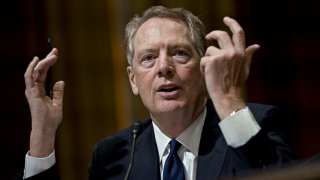
- Officials from the Trump administration have again sought to portray China as a threat that needs to be dealt with — just weeks before a presidential transition is set to take place.
- U.S. Trade Representative Robert Lighthizer said one of President Donald Trump's achievements over the last four years was showing that there's "a major issue" with China.
- His comments followed that of Commerce Secretary Wilbur Ross, who said Tuesday that China remains the "principal military and economic threat" in Asia.
Officials from President Donald Trump's outgoing administration have again sought to portray China as a threat that needs to be dealt with — just weeks before President-elect Joe Biden takes over the White House.
Speaking at the Milken Institute Asia Summit on Thursday, U.S. Trade Representative Robert Lighthizer said one of Trump's achievements over the last four years was that he showed there's "a major issue" with China.
"This president realized that we had a trade system that has gone off the rails, that needed to be reset both in terms of what our objectives are, but also in terms of realizing that we have to deal with China as the biggest growing economy in the world and a very different system," he said during a dialogue held virtually.
His comments followed that of Commerce Secretary Wilbur Ross, who said Tuesday at the same summit, that China remains the "principal military and economic threat" in Asia.
Lighthizer, known to be a China skeptic, said Chinese industrial policies have hurt the U.S. and other economies. He reiterated common complaints about China's practices, such as subsidizing state-owned companies and forced transfer of technology from foreign firms to their Chinese partners.
To be clear, other countries share U.S. concerns about China too. But the Trump administration has often preferred to confront Beijing unilaterally — denouncing dispute settlement organizations such as the World Trade Organization.
Money Report
The U.S. trade representative maintained that the Trump administration did work with allies. He said he's been involved in a trilateral group of the U.S., Europe and Japan that met several times over the last four years to discuss issues such as WTO trade rules. But the U.S. can't allow allies to "veto" decisions concerning U.S. national security, he added.
The U.S. under Trump has frequently imposed punitive policies on China based on national security grounds. Those policies include raising trade tariffs and restricting Chinese companies' access to crucial American suppliers.
Many experts have disagreed with the way Trump has sought to address concerns about China.
Biden, too, has sought to differentiate his approach from Trump's. The president-elect has said he would work with allies in Europe and Asia to come up with "a coherent strategy" on China.






